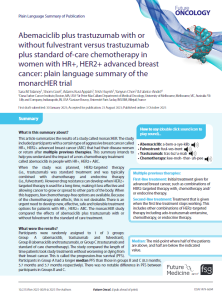A plain language summary of the monarcHER study: abemaciclib plus trastuzumab with or without fulvestrant versus trastuzumab plus standard-of-care chemotherapy in women with HR+, HER2+ advanced breast cancer
 This Plain Language Summary of Publication article from Future Oncology summarizes the results of a study called monarcHER. The study included participants with a certain type of aggressive breast cancer called HR+, HER2+ advanced breast cancer (ABC) that had their disease worsen or return after multiple previous therapies.
This Plain Language Summary of Publication article from Future Oncology summarizes the results of a study called monarcHER. The study included participants with a certain type of aggressive breast cancer called HR+, HER2+ advanced breast cancer (ABC) that had their disease worsen or return after multiple previous therapies.
Visit Future Medicine using the link to read the article.
The original article on which this summary is based is called ‘Abemaciclib plus trastuzumab with or without fulvestrant versus trastuzumab plus standard-of-care chemotherapy in women with hormone receptor-positive, HER2-positive advanced breast cancer (monarcHER): a randomised, open-label, phase 2 trial’. The article was published in the Lancet Oncology.
Visit ScienceDirect using the link to read the article.
